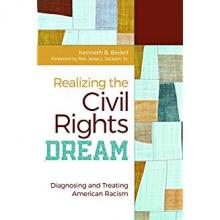What Can I Do About Racism
A small group at the church I attend is reading Isabel Wilkerson’s book, Caste. We are an all-white group learning about racism. One of the participants said, “I wish I knew something that I can do about racism.” Since then, the question has haunted me.
What can I do to work toward ending racism in America? I find it helpful to start with the two categories of racial expressions. Racism is embedded in two interacting and interconnected places: the minds of people, like me, and the structures of society.
My mind controls what I think and how I interact with others. Addressing racism in these two areas requires developing my sense of racism. I can intentionally increase my sense of racism by listening, reading, and discussing racism. I need to become more sensitive to biases, both conscious and unconscious. Only then will I reduce the times when I promote a racist idea or express a microaggression that suggests white people are superior. I have found that putting myself in uncomfortable places like volunteering in a prison or attending a worship service at a tradition that is not my own is a good way to develop my sensitivity to white privilege. My increased sensitivity will prepare me to be an interrupter. Interrupting is a skill that I can develop as I learn more about racism and as I become more confident in knowing when and how to interrupt.
For me to address the structures of society, I need to work with other people. Some structures are institutional, and others are systemic. Institutional racism includes customs, practices, policies, rules, and programs of groups and organizations. Systemic racism includes the structure of the government, the laws that govern the economy, and systems like the educational system and the judicial system. Again it is important for me to develop my sense of racism so that I see structural racism. Since fixing structural racism requires working with other people, it is particularly important to talk with others to discover and understand structural racism.
I have increased possibilities to impact the institutions that I have a relationship with. For example, I may learn about the race-based practices in an apartment building in a distant city. This should prompt me to investigate whether my rent is reduced because employees of color are paid a wage that they cannot live on. Most places of employment, organizations or clubs, and religious communities have history, customs, practices, and policies that protect and preserve white privilege. Working with others to identify and change institutions is one thing I can do.
When it comes to systemic racism, political action is required. An obvious first step is that I need to be an informed voter. But politicians have a poor record of taking bold steps to address racism, so advocacy organizations are essential to promote political action to address racism. There are many ways to support advocacy organizations, from helping establish a new organization, to participating as a leader, to becoming an active member and supporter, to providing financial support.
Having this map of things that I can do is both helpful and overwhelming. There is so much to do. I find it useful to ask myself three questions:
- What are obvious opportunities where I can contribute to ending racism?
- What seems particularly important to me at an emotional level?
- Where do I have relationships with other people that make it possible for us to work together to end racism?
Then, recognizing that this still leaves me with more possibilities than I can address with any seriousness, I identify specific places to focus.
Developing my sensitivity to racism is essential to my ability to address all expressions of racism, so I have a list of books and read them. I participate in discussion groups like the discussion of Caste that prompted me to write this note. I go to museums as I did on July 4th when I visited the Lynching Museum in Montgomery, Alabama. And I talk to my neighbors, friends, and relatives about racism. Sometimes I talk to strangers about racism.
Being an interrupter means taking advantage of opportunities to point out racism. This takes intentionality. I am working on becoming better at interrupting by pointing out racism in everyday encounters. Interrupting is often the first step in addressing institutional racism as well as interpersonal racism. For example, the church group discussion of Caste is both an opportunity to develop sensitivity and a chance to participate with a group of people who are interested in helping the church develop institutional strategies to address racism.
Addressing systemic racism is essential if America is ever going to become a multi-cultural nation without racism. Addressing systemic racism is vital because in many cases, institutional practices are allowed or even encouraged by governmental, economic, and other social systems. As an individual, I find addressing systemic racism to be the most difficult, even though it is the most important. Every day my Outlook mailbox fills up with requests from very worthy organizations looking for financial support. It would be impossible for me to respond to all of them, but I do support some. However, I know that is not enough.
I find it helpful to identify and focus on a small part of systemic racism. For years education has been a passion of mine. The educational system is also a place where racism is sustained in our society. White privilege ensures that a higher percentage of white children than children of color learn to read by the 4th grade, graduate from high school, attend college, graduate from college, and have opportunities for advanced degrees. I can’t change all of that, but I can identify one place where I can learn about what is happening, share this with others, and look for other ways that I can be supportive of its efforts to address systemic racism in education. I work with Rust College, a Historically Back College in Holly Springs, Mississippi. I can tell the story to encourage others to support the college’s important mission. I can also engage with others to think about how the college can faithfully address the inequities in education. For more than 25 years, I have done this by sometimes serving on the Board of Trustees and sometimes as a friend of the college.
Finally, I know I only have one life to live, so I ask myself the question what is the most audacious work I can participate in to address racism? To that end, I have started conversations with friends about addressing systemic racism at the root of the very structure of American society: the distribution of power defined by the Constitution. How can the American people create a system of government that benefits from the contributions of all racial and other identity groups? What would America look like if no individual experienced greater barriers to achieving personal goals than any other person? How can we modify Article V of the Constitution so that there is a peaceful transition to a system of government that does not privilege white people and is not based on our racist past and present?
While I started with the question of what can I do, the most important question is what more can I do? And the related question of how can I work with others?




 Contact Us
Contact Us